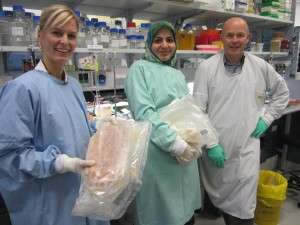Researchers develop milk that protects against HIV

Melbourne researchers have developed cows' milk that protects human cells from HIV.
The milk contains antibodies which defend against human immunodeficiency virus (HIV).
The next step will be to develop it into a cream which women can apply to protect themselves from contracting HIV from sexual partners.
Melbourne University's Dr Marit Kramski and colleagues found that using cows to produce HIV-inhibiting antibodies is cheaper than existing methods.
They worked with Australian biotechnology company Immuron Ltd to develop the milk. The scientists vaccinated pregnant cows with an HIV protein and studied the first milk that cows produced after giving birth.
The first milk, called the colostrum, is naturally packed with antibodies to protect the newborn calf from infections. The vaccinated cows produced HIV antibodies in their milk.
"We were able to harvest antibodies specific to the HIV surface protein from the milk," said Marit, who is presenting her research this week as one of the winners of Fresh Science—a national program for early-career scientists.
"We have tested these antibodies and found in our laboratory experiments that they bind to HIV and that this inhibits the virus from infecting and entering human cells," she said.
Cows cannot contract HIV. But their immune systems develop antibodies against the foreign protein.
The HIV-inhibiting antibodies from cows' milk will be developed into a cream called a microbicide that is applied into the vagina before and /or after sex to protect women from contracting sexually transmitted infections. Other microbicides are being developed around the world but the antibodies in this research are easier and cheaper to produce, providing a new HIV-prevention strategy.
"We hope that our anti-HIV milk antibodies will provide a user-friendly, female-controlled, safe and effective tool for the prevention of sexually acquired HIV infection," Marit said.
"If proven effective in humans, it will empower women to protect themselves against HIV."
About 30 million people are living with HIV globally and there is presently no effective vaccine for humans.The research was supported by the Australian Centre for HIV and Hepatitis Virology Research and the NHMRC.
Marit and her colleagues are now developing plans for animal and human studies.
Marit Kramski is one of 12 early career scientists unveiling their research to the public for the first time thanks to Fresh Science, a national program sponsored by the Australian Government.
More information: aac.asm.org/content/early/2012 … AC.00453-12.abstract















